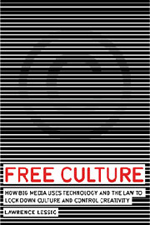
|
Penn Reading Project: Free Culture
The Provost, the Council of Undergraduate Deans, and the Office of College Houses and Academic Services are pleased to announce that Lawrence Lessig’s Free Culture: The Nature and Future of Creativity will be the text for this year’s Penn Reading Project (PRP). On the afternoon of Sunday, September 3, 2006, groups of first-year students and faculty leaders will join together to discuss the book as part of New Student Orientation for the Class of 2010. Mr. Lessig, a Penn alumnus, C ’83, W ’83, who is professor of law at Stanford Law School, plans to join us on campus during PRP week. That week will also feature supporting programming with prominent Penn faculty and other experts, and there will be additional lectures, symposia and workshops that will take place over the semester. In Free Culture, Mr. Lessig, whom The New Yorker described as “the most important thinker on intellectual property in the internet era,” points out a fundamental irony: technology has given millions of citizens a voice, a platform, and unprecedented access to ideas—while at the same time, special interests and expanded laws have limited our opportunities to use it. Copyrights and patents have grown stricter, and are enforced in ways never originally imagined. Media companies, citing problems of piracy, control their output to a degree that educational institutions cannot use vital materials (this has prompted a number of class action suits related to the DCMA—Digital Millenium Copyright Act). Proprietary software and closed source code make it difficult for the public to verify information, as in a well-known case involving Florida elections and Diebold voting machines. In short, Mr. Lessig argues that our collective freedoms are abridged in the current system, and we need new models. Citing many examples, he proposes some solutions: the free software movement, open source code, artists working under “Creative Commons” licenses, “Wikis” that allow free editorial access on an honor system, and more. Free Culture is at once a history of intellectual property laws, an imaginative exploration of technology, and a passionate argument to reexamine our current business practices. It is as much about science (medical and genomic patents) as about the creative arts, and will resonate in many disciplines. PRP, now in its 16th year, was created as an introduction for incoming freshmen to academic life at Penn. Past PRP books include Benjamin Franklin’s Autobiography, The Quiet American (Greene), Things Fall Apart (Achebe), Candide (Voltaire), Metamorphosis (Kafka), The Woman Warrior (Kingston), Frankenstein (Shelley), Arcadia (Stoppard) and The Tipping Point (Gladwell). For information about PRP see: www.collegehouses.upenn.edu/prp/. Faculty members in all 12 schools are invited to take part as PRP discussion leaders. A copy of the text will be sent to discussion leaders and students in July, along with additional information about the Reading Project. For information, and to volunteer as a leader, contact David Fox, director, Penn Reading Project, (215) 573-5636 dfox@sas.upenn.edu.
Almanac, Vol. 52, No. 34, May 23, 2006
|
